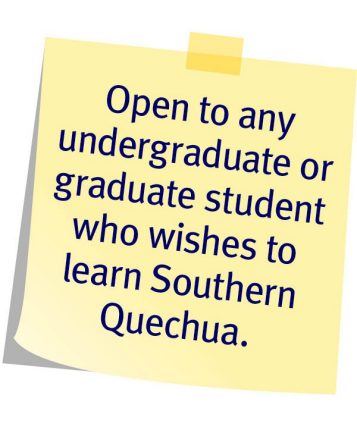Quechua: Why study Quechua?
What is Quechua? Where is it spoken? How many people speak it? Why study it? And what has any of this got to do with Star Wars? Learn the answer to these and other questions you may have about Quechua and the Quechua language program at U-M from a current student. And don't forget you still have time to apply for a FLAS scholarship to study this and other qualifying languages!
Quechua is an indigenous language of South America. Once spoken in the Inka Empire, it now has an estimated 8-10 million speakers in Peru, Bolivia, Ecuador, and other Andean countries.
Learn the language and culture of the Quechua people in LACS 471-476: Elementary Quechua 1&2, Intermediate 1&2, and Advanced 1&2. This FLAS-eligible course is an essential resource for students interested in working with indigenous communities of the Andes.
Quechua Instructor Adela Carlos Rios, Lecturer II in Latin American & Caribbean studies, is a native of Cusco, Peru, and speaks Quechua as her first language. Adela has been teaching Quechua at the University of Michigan since fall 2014. She has a research interest in Quechua ethnobotany, or how the Quechua people utilize medicinal plants to improve their health and maintain their cultural identity.
Quechua courses can often be made available to Big Ten institution students through Big Ten CourseShare. For inquiries, please contact: lacs.office@umich.edu

Quechua at U-M: A comprehensive Quechua language program featuring beginning, intermediate, and advanced levels, and taught by Adela Carlos Rios in Fall and Winter terms
Quechua in Cusco: An intensive and immersive Quechua language and culture program in Cusco, Peru, featuring beginning, intermediate, and advanced levels, and taught by Centro Tinku instructors over 7 weeks in the summer.
The Summer language program in Quechua is part of our partnership with Centro Tinku, an educational and cultural center in Cusco, Peru. Centro Tinku focuses on the modern Quechua of the Southern Peruvian Andes as it is spoken today. Tinku's experienced instructors are native Quechua speakers trained in education and language instruction.
- Centro Tinku offers the same three levels of Quechua language offered in Ann Arbor –beginning, intermediate, advanced—compressed into an accelerated, seven-week program.
- Classes meet for four hours per day, five days a week, for seven weeks, for a total of 140 language instruction contact hours per course: the equivalent of a full academic year on campus.
- To complement the language training, participants also experience a series of lectures on Quechua culture and history and, when pandemic conditions allow, are guided on an extensive program of excursions and cultural events. Enrollment is generally limited to 10 students per level.
We recommend a basic-to-intermediate knowledge of Spanish, as this will be the bridge language used in class.
Summer 2024 Quechua Language Program in Cusco
Intensive Quechua – FLAS Eligible
Centro Tinku and the University of Michigan
Program Location: in-person, Cusco (Peru)
Dates: June 25, 2024, to August 9, 2024
Geared especially to students of Anthropology, History, Linguistics, Archaeology, Public Health, Environmental Studies, and other relevant disciplines, the program consists of seven weeks of intensive, highly individualized classroom work and workshops at elementary, intermediate, and advanced levels. Our experienced instructors are native Quechua speakers trained in education and language instruction.
This course will center on the modern Quechua of the Southern Peruvian Andes, as it is spoken today in Cusco, the heartland of the Incas. During the summer program, students will be involved in cultural activities related to language and cultural acquisition, including interaction with Quechua speakers, learning of traditional songs, and participation in rituals corresponding to the Andean calendar of fiestas.
This cultural immersion program includes over a total of 140 in-class contact hours and effectively guarantees a path to linguistic fluency through the various levels offered.
It is expected that upon completion of the program, students can continue studying Quechua in the academic year through our in-house Quechua online program and/or enroll in our in-person Intensive Quechua program in the following years.
Program schedule and application material soon available through the University of Michigan LACS webpage or directly by writing to jeanjacquesdecoster@gmail.com or decoster@centrotinku.com.
Tuition and Academic costs: $ 4,500.00 US for the totality of the program.
Centro Tinku also offers 50% scholarships on tuition costs to Latin American students not eligible for other funding.
Additional Information about the 2024 Quechua program
The Centro Tinku Intensive Quechua Summer Program is FLAS eligible.
Please note: While students may opt to receive U-M credit by enrolling in the corresponding course, this enrollment is not required. Students enrolling for credit at Michigan will be required to pay Michigan tuition in addition to other program fees. U-M undergraduate students receive U-M credits by paying Centro Tinku's tuition and fees, as well as a CGIS administrative fee of $450. Bear in mind that regardless of whether they enroll through Michigan or directly through Centro Tinku, the same academic criteria will apply to all students.
Non-UM students may email programas@centrotinku.com to enroll directly with Centro Tinku.
* Centro Tinku also offers 50% scholarships on tuition costs to Latin American students not eligible for other funding. Latin American students interested in Centro Tinku scholarships can write directly to jeanjacquesdecoster@gmail.com or decoster@centrotinku.com.

